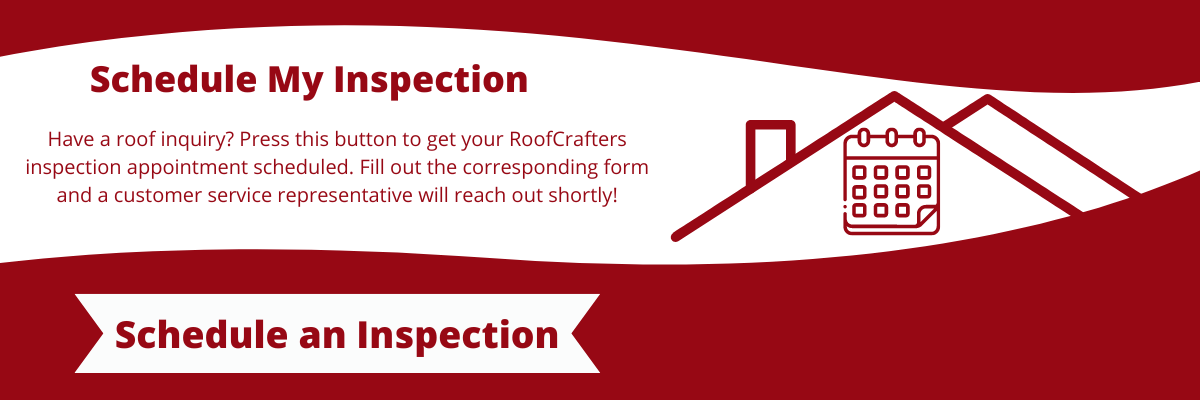Discover the Best Commercial Roofing Options in St. Petersburg, Florida
September , 2023 | 9 min. read
By Kevin Mills
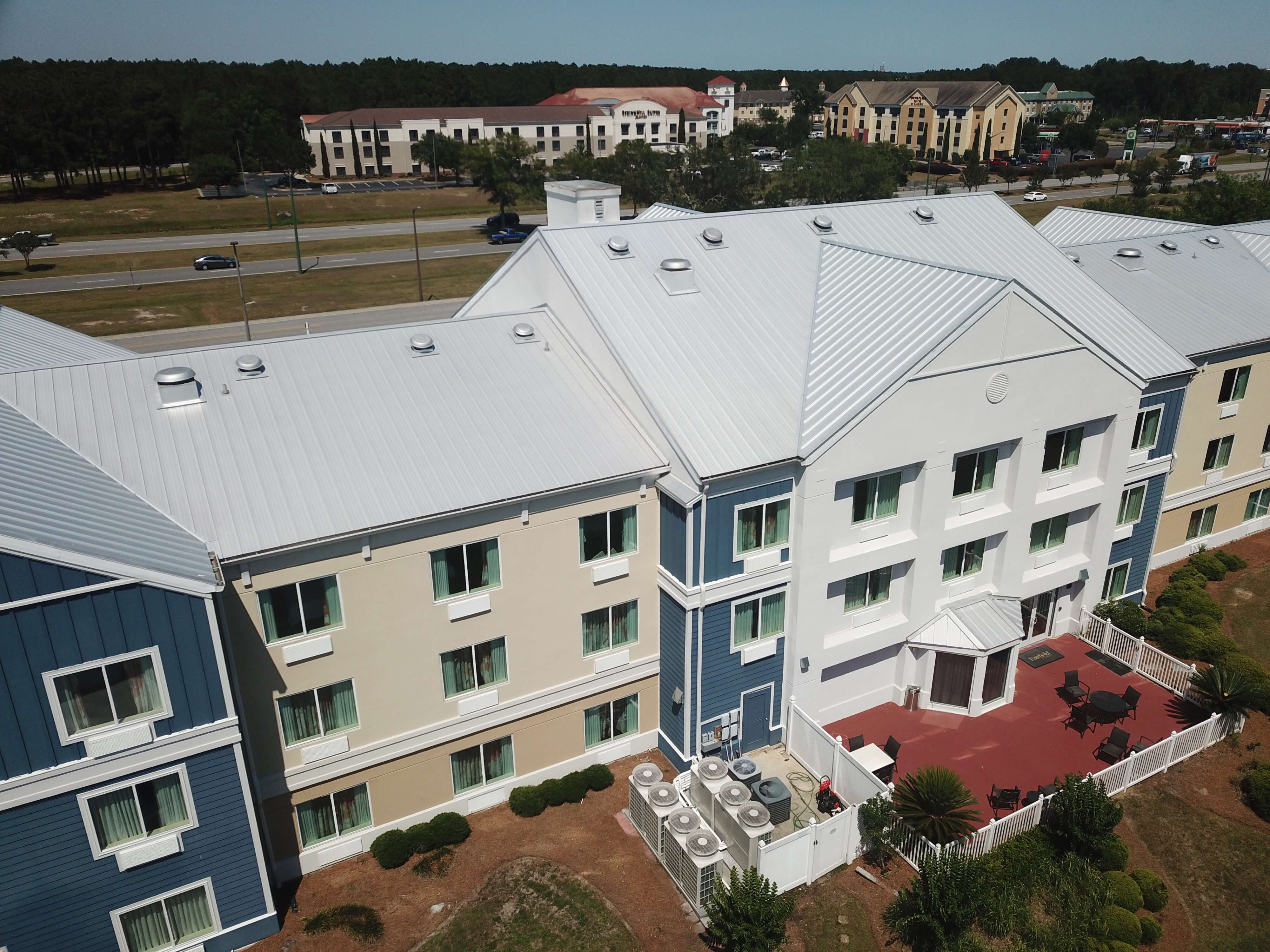
Is the roof of your St. Petersburg commercial property near the end of its lifespan?
Choosing the right commercial roofing can be overwhelming due to the many options available. Factors to consider include budget and specific business needs.
RoofCrafters has been the go-to resource for commercial roofing in the St. Petersburg area for three decades. Whether you need a brand-new roof or leak repairs, we aim to guide you toward a decision that’s both sound and satisfying.
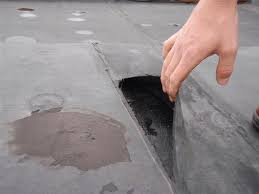
What's our method? Our first move is always to conduct a comprehensive commercial roof inspection. Although we won't inspect here, we want to share helpful information from our 30 years in business. This way, you can choose your next roof investment wisely.
By the end of this guide, you'll have gained insights into:
- The four key criteria for selecting the best roofing type for your St. Petersburg business
- An overview of the commercial roofing materials available in the market
- A ranking of the top 5 commercial roofing options ideal for St. Petersburg
- The unique pros and cons for each roofing type
Ready to dive in? Grab your notepad and let's unravel the mystery of commercial roofing!
Decoding St. Petersburg's Commercial Roof Construction: Flat, Low Slope, or Steep Slope?
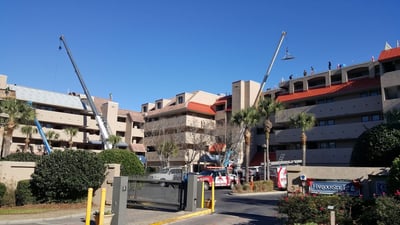
To handle commercial roofing in St. Petersburg, it's important to know its structure. Essentially, commercial roofs fall into one of three construction categories: flat, low slope, and steep slope. Let's dissect these to see what each entails.
Petersburg's Popular Choice: Commercial Flat Roof Construction
Flat roofs are a prevalent choice in St. Pete's commercial landscape for good reasons. With this construction type, architects and engineers can design solutions to manage water runoff. They can also install rooftop equipment. In Florida's climate, modern building codes often need a slight slope. Installing tapered insulation achieves this. This solves the issue of water pooling. It also improves the roof's insulation. This helps water drain better. However, these extra features can add to the project's cost.
Petersburg's Low Slope Construction: Budget-Friendly but Material-Specific
Low-slope constructions have a natural slope, so designers don't need tapered insulation. This can be a cost-saving feature, particularly useful in St. Petersburg where water drainage is essential. Yet, material selection becomes important here. For example, if you put metal roofing on a low-slope building in St. Pete, it may need more upkeep. It could develop leaks because of the city's special weather.
Steep Slope Construction: When Commercial Meets Residential
Commercial roofing in St. Pete is like residential construction, with gable or hip roof styles used on steep slopes. The construction materials used are metal or wood trusses. Steep slopes drain water well and look nice, but may not be right for every business and can affect the project cost.
To choose the best roofing for your commercial property in Pinellas County, learn about three main types of roof construction. Let's discuss the 4 factors used to decide the material type.
The St. Petersburg Playbook: Four Key Factors for Choosing Your Commercial Roofing System
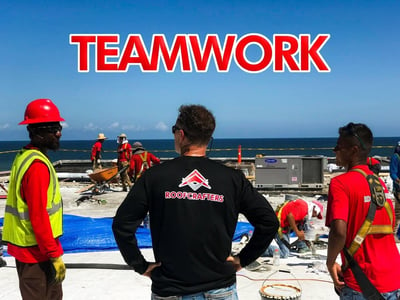
When selecting a commercial roofing system for your St. Pete property, it's not about looks or cost. Instead, four core factors influence the decision-making process. Knowing these factors can help you make a more informed choice that aligns with your business needs and budget constraints. Here's the breakdown:
Lifespan: How Long Do You Want Your Roof to Last?
The expected longevity of your roof often dictates the type of material you'll choose. Some materials last longer than others. For instance, metal roofs often outlive asphalt-based systems. Especially in St. Petersburg, where conditions can be harsh. It's important to select materials that can withstand the elements for an extended period.
Durability: What's Going On Up There?
The level of foot traffic and the weight of equipment installed on the roof are vital considerations. If you have HVAC units, vents, or satellite systems on your roof. You'll need a stronger roofing material that requires regular servicing. We will consider these factors when choosing the material's thickness for Florida's climate.
Energy Efficiency: The Buzzword in St. Petersburg's Commercial Roofing
Given the emphasis on sustainable construction in recent years, energy efficiency has become a hot topic. In St. Pete, most governmental projects now need an energy efficiency rating for new commercial roofing. That's where the R-value comes into play. This rating measures a roof's thermal resistance; the higher it is, the better the material will insulate against Florida's sun and heat.
Cost: The Last but Not Least Factor
While most people focus on cost above all else, it's listed last here for a reason. Before we can give you a cost estimate for your commercial roof installation in St. Pete, we need to know three things that affect the total project cost. We can give you an accurate estimate if you tell us how long you want it to last, how durable it needs to be, and how much energy it should use.
Armed with this information, you're now better equipped to navigate your roofing options in St. Petersburg. Next, we'll explore the top 5 commercial roofing systems, along with their pros and cons, tailored for St. Pete's conditions.
Top 5 Commercial Roofing Types: Material Overview
If you own a commercial property in St. Petersburg, there are five roofing types to consider. Each option has its advantages, disadvantages, and costs. Understanding these will help you make the best decision.
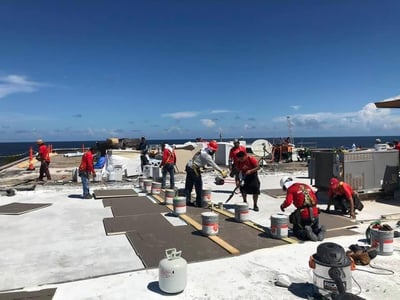
Single-ply roofing (TPO, PVC & EPDM)
- Pros: Energy-efficient, lightweight, fire-resistant, easy to repair.
- Cons: Not visually appealing, susceptible to punctures from high foot traffic.
- Cost: Moderate, varying by thickness (45-mil or 60-mil options).
Modified Bitumen (rubber roofing)
- Pros: Durable, suitable for high foot traffic, many installation methods.
- Cons: More expensive due to many layers, challenging to repair.
- Cost: High, especially for labor and materials.
Built-up roof (hot tar roofing)
- Pros: Long lifespan (25-30 years), very durable, handles heavy foot traffic well.
- Cons: High installation cost, dangerous to install.
- Cost: Very high due to many layers and hazardous installation procedures.
Metal Roofing (standing seam & screw-down)
- Pros: Long-lasting (50+ years), high wind resistance, aesthetic appeal.
- Cons: High initial investment for standing seam types.
- Cost: High for standing seam, moderate for screw-down types.
Asphalt shingles (upgraded & premium shingles)
- Pros: Good wind protection, aesthetically pleasing, longer lifespan (25-35 years) than basic shingles.
- Cons: Shorter lifespan compared to other commercial options, messy to replace.
- Cost: Moderate, depending on the type of upgraded shingles.
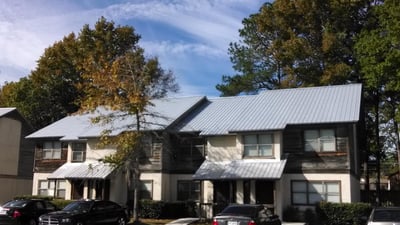
Different types of roofs have pros and cons based on factors like lifespan, durability, energy efficiency, and cost. Make your choice based on what fits your Pinellas County property's specific needs.
What Is the Right Type of Roof for Your Commercial Building?
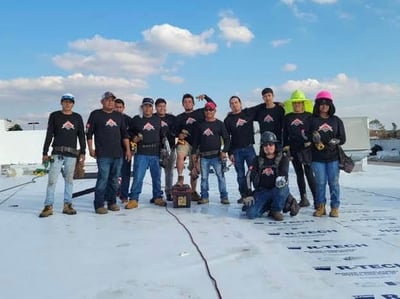
It depends. Choosing the right roof is important for the longevity and efficiency of your commercial building. Whether you're replacing an old roof or selecting one for a new construction, consider the following factors:
- Foot Traffic: Will the roof experience high foot traffic due to maintenance activities?
- Energy Efficiency: How important is it for the roof to insulate well and reflect heat?
- Chemical Exposure: Will the roof come into contact with grease, chemicals, or other corrosive elements?
- Wind Conditions: Is the building located in an area with high winds, such as coastal regions?
- Sun Exposure: Will the roof be exposed to intense sun and need UV resistance?
- Visibility: Is the aesthetic aspect important for your business?
- Budget: What is the investment you're willing to make?
- Longevity: How long do you expect the roof to last?
Your building's function and our local climate should influence your choice. Make sure to align your roofing decision with these important aspects to get the most out of your investment.
Need Help? If you need guidance on choosing the right roofing system, our team at RoofCrafters is here to assist. With 3 decades of commercial experience, we're here for you. Click the button below to schedule your inspection with us.
My name is Kevin Mills, and I am the lead estimator for RoofCrafters’ Tampa division. I’m originally from Michigan, and I enjoy hunting, fishing, and spending any free time outdoors. What I’m most passionate about, though, is helping business owners and homeowners alike achieve their roofing goals, all while providing a seamless customer journey.



